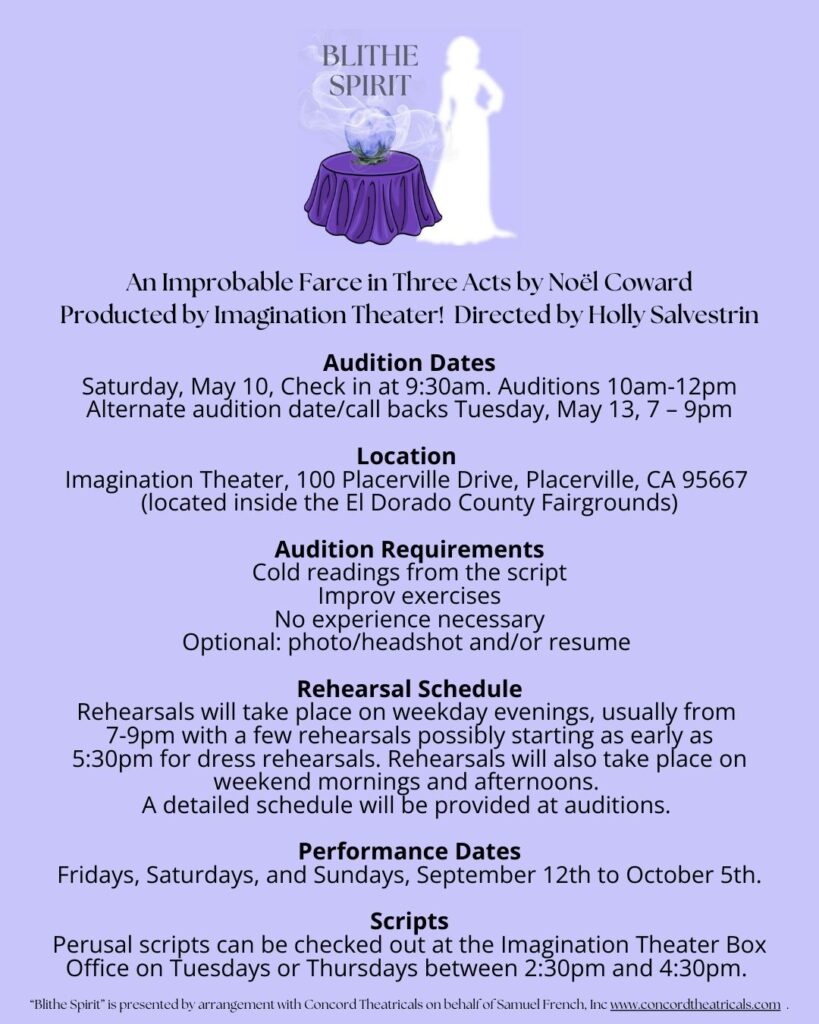


Imagination Theater holds auditions up to 6 months in advance of a show opening.
Check this page and follow us on Facebook and Instagram to learn about upcoming opportunities
Audition FAQ
Do I need previous experience to audition at IT!?
Experience is great and can be helpful, but anyone is welcome to audition. Some of our favorite onstage moments have come from first-time performers.
How long will the auditions take?
The audition notice will give you a start time and end time. You should plan to arrive about 15 minutes early to sign up and fill out your audition form. The audition is over when the director is done. This may be earlier or it may be later than anticipated, depending on the number of people auditioning. Come prepared with water, a snack and patience. Parents and friends are allowed to attend the auditions but will be asked to sit quietly in the back and not participate in the process.
What are the requirements for auditions?
It’s important that you read the audition notice carefully to be sure of the director’s requirements. Usually everyone who auditions for a musical must sing a song, read from the script on stage with other auditioners, and learn and perform a dance combination. Play auditions normally consist on script readings, general stage movement and some improvisation.
Be as prepared as possible by reading the script before the auditions. Sometimes you can borrow a copy of the script from the IT! Box Office; if not, try the library or online resources. Prepare for a singing audition by memorizing and practicing your chosen audition song (see below) until you are comfortable and confident. Many people also like listening to the show album and/or watching the movie of the show if available. This can help with characterization and plot, but don’t get too caught up in how the original actors performed — make it your own.
How do I choose a song?
If you have a vocal teacher, discuss your song choice and prepare it with their help. If you do not, start with these basic tips:
Choose a song from a Broadway show; other genres like pop songs are acceptable, but not encouraged.
- Choose a similar style to the show you are auditioning for, be it jazzy, rock În roll or traditional.
- Choose a song that fits well with your natural vocal range and style.
- Pick a song you already know, or at least one with a familiar tune. This will help with your learning time and confidence at the audition.
- Choose a back up song. Sometimes, the director will ask you to sing something else; so have another song ready just in case. Sheet music and karaoke tracks are available from many sources, including online retailers like Apply Music, Spotify and Amazon. Give yourself enough time to find and practice the song before the auditions. Please note that you are not allowed to sing along with a track that includes vocals!
What should I wear to the auditions?
For vocal and reading auditions, you may wear what you are most comfortable in. Keep in mind the theater could be cold or hot, so layers are best. Do not wear revealing or overly tight clothing. No bare shoulders or bare midriffs. Your shoes should be comfortable and easy to walk in; clunky clogs, high heels and flip flops are not ideal. For dance auditions, you must wear loose, comfortable clothing that you can stretch and move in. You should also wear either dance shoes like ballet, jazz or character shoes, or tennis shoes.
Do I need a resume and picture?
In some cases, the audition notice will ask for these, and it’s always a good idea to think back on your experience. For some auditions, your photo will be taken when you arrive to aid in the casting process. “Serious” and “performance career-oriented” auditioners are highly encouraged to provide resumes and photo head-shots. However, parents and auditioners are encouraged not to create lengthy and extensive resumes for young children.
Your resume should include your contact information, a list of other shows and roles you’ve had, your dance and music experience, and any special performance skills you may have (sword-fighting, for example). The picture should be a head and shoulders shot and have your name written on the back. In addition, all auditioners should bring a list of dates you know you are not available between the audition and Closing Night (i.e. vacations, work commitments).
What are Call-backs and how will I know if I need to be there?
Call-backs are the last step in the audition process and usually have more of the same singing, reading and dance elements as the regular audition. They are needed when the director wants to see people again, perhaps in different combinations or in different scenes/roles than before. Sometimes the director may have specific people sing a specific song from the show. If you are auditioning for a lead role, check the audition notice to see if you need to prepare another song. You will usually find out if you need to be at the Call-back auditions when the director posts a list online, on the theater door or talks to you individually.
How will I find out if I’m in the show?
The director will post online a cast list sometime after the Call-back auditions. It will include the names of everyone in the show and their role. If you’re on the list, congratulations and welcome! If you’re not, please try again next time. Please note that all decisions are final and may not be disputed. Some changes may occur if a cast member is unable to accept their role, but it’s up to the director to make those changes, and arguing will likely decrease your chances both now and in the future!
What are the responsibilities of the cast member?
Cast members are expected to attend all rehearsals and performances, participate in set construction and help with publicity. Any absences must be discussed and approved by the director before the rehearsal. Cast members are also expected to learn their parts on-schedule, have a positive attitude, keep focused during rehearsals, and respect their fellow cast members and production staff and ALL ADULTS. In addition, the organization has a “no physical contact” policy, which limits touching and hugging in our facility.
Is parental involvement required for minors?
Parents are responsible for transporting their children to and from rehearsals. Please keep in mind that rehearsals are not a contract for child care, so changes in the schedule should be expected and parents should remain flexible. Parents are encouraged to join in their children’s set construction and publicity responsibilities. If you are interested in helping in other ways, such as costumes, lights, stage crew, please see the director. Families are also welcome to volunteer for ushering and other responsibilities through the box office.
What is the rehearsal schedule like?
The specific schedule will be passed out and posted by the director and is subject to change. Generally, rehearsals take place on weekday evenings and weekend days as necessary. The schedule is generally light in the beginning and more intense as opening night approaches.
What is the performance schedule like?
A production can run from 3-6 weeks and there are about 3-4 shows per weekend. Cast members are required to be at performances as agreed, for a successful production. The schedule depends on the size of the show and the judgment of the artistic director.

